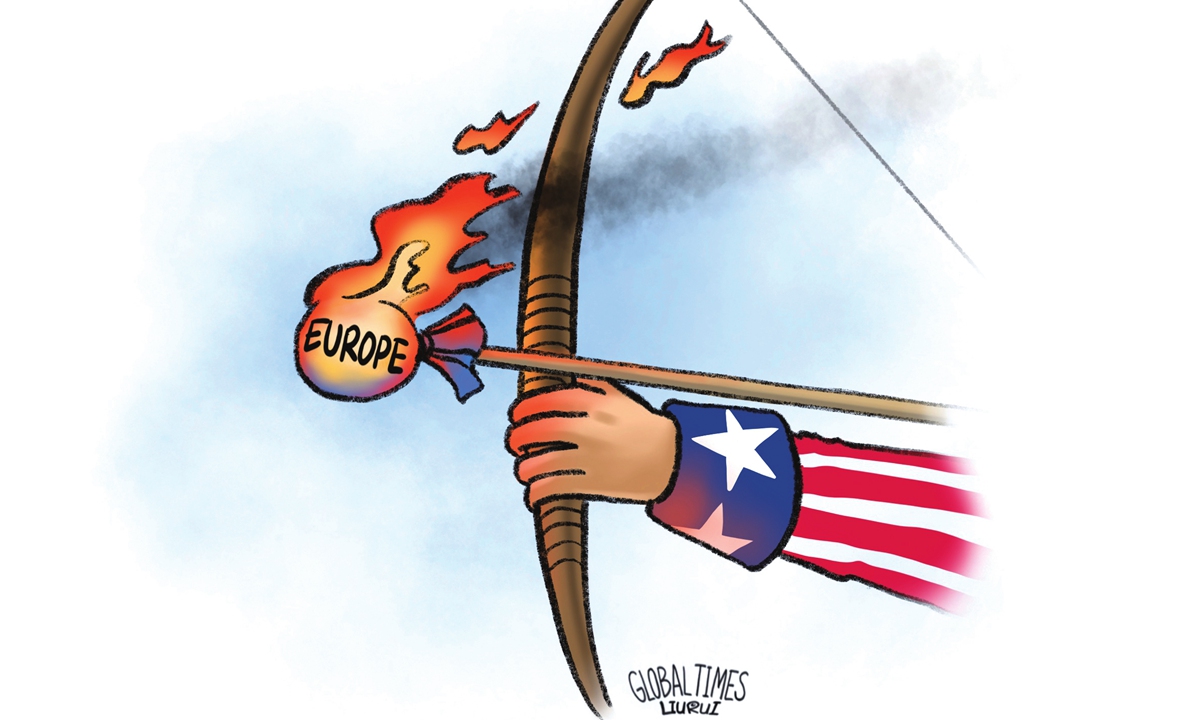
Illustration: Liu Rui/Global Times
With a potential Cold War-style missile crisis looming, Europe is being drawn into another arms race. Whether to follow the US into the vortex of military confrontation with Russia or to build a defense framework that meets the security interests of all parties, Europe should now make choices.
Russian President Vladimir Putin warned on Sunday that Moscow would resume the production of intermediate-range nuclear weapons and station similar missiles within striking distance of the West if the US deploys long-range missiles in Germany. Earlier this month, during the NATO summit in Washington, the US announced that it would begin deploying long-range missiles in Germany from 2026, prompting concern from the Russian side.
With the US and Russia now talking tough about missile deployment, a Cold War-style missile crisis, as Putin warned, seems imminent. Previously, the existence of the 1987 Intermediate-Range Nuclear Forces (INF) Treaty, an important guardrail to limit the escalation of conflict between the two countries, allowed Moscow and Washington to spare the world the fear of missile crises in the post-Cold War era.
However, the decision by both sides to withdraw from the INF Treaty in 2019 has significantly increased the likelihood that the deployment of intermediate-range ballistic and cruise missiles by the two countries will become a reality. The world is worried: How far are we from hearing "tough words" from the US and Russia to actually witnessing their "tough actions"?
Against this backdrop, it is feared that the biggest potential victim could be Europe. Commenting on Washington's possible deployment of missiles, Kremlin spokesman Dmitry Peskov recently said Russia has enough potential to deter these missiles, but NATO members in Europe are only serving as targets in the standoff, as Washington continues to "profit" from the escalation.
With the Russia-Ukraine war, distrust of Russia in many European countries is driving growing public support for strengthening defenses against the country. However, Washington, which has almost overwhelming influence in Europe, has played a major role in fomenting, promoting, and even leading such efforts on the continent. It is increasingly drawing Europe into its global military confrontation with Moscow.
Europe, a region that has already experienced two world wars and is used to focusing mainly on economic development, is now turning into a continent with intensified military and war preparations and closer integration with the US' war machine NATO.
If Europe follows Washington's aggressive military security concepts and US deployments, it will only result in serious damage to the European security structure and the possibility of greater insecurity. The deployment of US weapons in Europe will inevitably turn the continent into a battlefield and even the first target of Russia's strikes. In the end, as Peskov put it, the US will benefit while European countries and Russia will suffer.
Under US influence, Europe is falling into a vortex of confrontation with Russia. So far, the region has not considered how to form a future security relationship with Moscow, with many European countries simply excluding Russia from their post-war security structures. Instead of building a more secure defense mechanism, Europe is now moving toward not only a more confrontational structure with military preparations, but also a strategic dilemma of growing insecurity.
A more rational Europe would stay out of engaging in the US-Russia arms race and serving the role of Washington's proxy. If a direct conflict between Russia and Europe breaks out, Europe will suffer severely in various aspects while Washington will benefit from Europe's protracted arms race with Russia. Therefore, the European countries should not accept the US' policy as Europe's policy, but pursue their own independent foreign policy.
At the same time, the international community should also encourage negotiations between the US and Russia on strategic stability and arms control, including a new INF Treaty and New START. After all, a Cold War-style missile crisis threatens the peace and development not only of Europe, but of all mankind.




